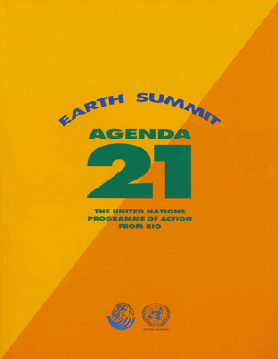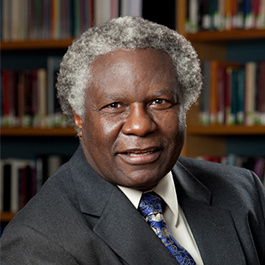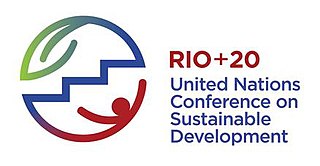
Sustainable development is an organizing principle that aims to meet human development goals while also enabling natural systems to provide necessary natural resources and ecosystem services to humans. The desired result is a society where living conditions and resources meet human needs without undermining the planetary integrity and stability of the natural system. Sustainable development tries to find a balance between economic development, environmental protection, and social well-being. The Brundtland Report in 1987 defined sustainable development as "development that meets the needs of the present generation without compromising the ability of future generations to meet their own needs". The concept of sustainable development nowadays has a focus on economic development, social development and environmental protection for future generations.
The World Summit on Sustainable Development 2002, took place in South Africa, from 26 August to 4 September 2002. It was convened to discuss sustainable development organizations, 10 years after the first Earth Summit in Rio de Janeiro.

Agenda 21 is a non-binding action plan of the United Nations with regard to sustainable development. It is a product of the Earth Summit held in Rio de Janeiro, Brazil, in 1992. It is an action agenda for the UN, other multilateral organizations, and individual governments around the world that can be executed at local, national, and global levels. One major objective of the Agenda 21 initiative is that every local government should draw its own local Agenda 21. Its aim initially was to achieve global sustainable development by 2000, with the "21" in Agenda 21 referring to the original target of the 21st century.

The Brundtland Commission, formerly the World Commission on Environment and Development, was a sub-organization of the United Nations (UN) that aimed to unite countries in pursuit of sustainable development. It was founded in 1983 when Javier Pérez de Cuéllar, the Secretary-General of the United Nations, appointed Gro Harlem Brundtland, former Prime Minister of Norway, as chairperson of the commission. Brundtland was chosen due to her strong background in the sciences and public health.
Range state is a term generally used in zoogeography and conservation biology to refer to any nation that exercises jurisdiction over any part of a range which a particular species, taxon or biotope inhabits, or crosses or overflies at any time on its normal migration route. The term is often expanded to also include, particularly in international waters, any nation with vessels flying their flag that engage in exploitation of that species. Countries in which a species occurs only as a vagrant or ‘accidental’ visitor outside of its normal range or migration route are not usually considered range states.

Calestous Juma was a Kenyan scientist and academic, specializing in sustainable development. He was named one of the most influential 100 Africans in 2012, 2013 and 2014 by the New African magazine. He was Professor of the Practice of International Development and Faculty Chair of the Innovation for Economic Development Executive Program at Harvard Kennedy School. Juma was Director of the School's Science, Technology and Globalization Project at Harvard Kennedy School as well as the Agricultural Innovation in Africa Project funded by the Bill and Melinda Gates Foundation. His last book, Innovation and Its Enemies: Why People Resist New Technologies, was published by Oxford University Press in 2016.
James William MacNeill, OC was a Canadian consultant, environmentalist, and international public servant.
The Global Scenario Group (GSG) was an international, interdisciplinary body convened in 1995 by the Tellus Institute and the Stockholm Environment Institute (SEI) to develop scenarios for world development in the twenty-first century. Further development of the Great Transition scenarios has been carried on by the Great Transition Initiative (GTI).
The International Institute for Environment and Development (IIED) is an independent policy research institute whose stated mission is to "build a fairer, more sustainable world, using evidence, action and influence in partnership with others." Its director is Dr Tom Mitchell.

The German Advisory Council on Global Change is an independent, scientific advisory body to the German Federal Government, established in 1992 in the run-up to the Rio Earth Summit (UNCED).
Sustainability science first emerged in the 1980s and has become a new academic discipline. Similar to agricultural science or health science, it is an applied science defined by the practical problems it addresses. Sustainability science focuses on issues relating to sustainability and sustainable development as core parts of its subject matter. It is "defined by the problems it addresses rather than by the disciplines it employs" and "serves the need for advancing both knowledge and action by creating a dynamic bridge between the two".

Applied sustainability is the application of science and innovation, including the insights of the social sciences, to meet human needs while indefinitely preserving the life support systems of the planet.

Sustainability is a social goal for people to co-exist on Earth over a long time. Definitions of this term are disputed and have varied with literature, context, and time. Experts often describe sustainability as having three dimensions : environmental, economic, and social, and many publications emphasize the environmental dimension. In everyday use, sustainability often focuses on countering major environmental problems, including climate change, loss of biodiversity, loss of ecosystem services, land degradation, and air and water pollution. The idea of sustainability can guide decisions at the global, national, and individual levels. A related concept is sustainable development, and the terms are often used to mean the same thing. UNESCO distinguishes the two like this: "Sustainability is often thought of as a long-term goal, while sustainable development refers to the many processes and pathways to achieve it."

The United Nations Conference on Sustainable Development (UNCSD), also known as Rio 2012, Rio+20, or Earth Summit 2012 was the third international conference on sustainable development aimed at reconciling the economic and environmental goals of the global community. Hosted by Brazil in Rio de Janeiro from 13 to 22 June 2012, Rio+20 was a 20-year follow-up to the 1992 United Nations Conference on Environment and Development (UNCED) held in the same city, and the 10th anniversary of the 2002 World Summit on Sustainable Development (WSSD) in Johannesburg.
This is a list of notable events relating to the environment in 1987. They relate to environmental law, conservation, environmentalism and environmental issues.

In the United Nations, the Post-2015 Development Agenda was a set of talks and discussion that led to the creation of the 2016 Sustainable Development Goals. This replaced the 2015 Millennium Development Goals.

The United Nations created 17 world development goals called the Sustainable Development Goals (SDGs). They were created in 2015 with the aim of "peace and prosperity for people and the planet, now and into the future."
Green imperialism is a derogatory epithet alluding to what is perceived as a Western strategy to influence the internal affairs of mostly developing nations in the name of environmentalism.

Future generations are cohorts of hypothetical people not yet born. Future generations are contrasted with current and past generations and evoked in order to encourage thinking about intergenerational equity. The moral patienthood of future generations has been argued for extensively among philosophers, and is thought of as an important, neglected cause by the effective altruism community. The term is often used in describing the conservation or preservation of cultural heritage or natural heritage.
At the Toronto Conference on the Changing Atmosphere: Implications for Global Security, hosted by Canada in Toronto, Ontario, starting on 27 to 30 June 1988, the 300 participants—including policy makers, international scientists, non-governmental and governmental organizations, and United Nations organizations—issued a warning at the conclusion of the conference that humans had unintentionally triggered uncontrolled changes to the atmosphere that if left unchecked could ultimately lead to "consequences could be second only to a global nuclear war." The Toronto Conference took place in the same week that James Hansen, who served as director of NASA's Manhattan-based Goddard Institute for Space Studies (GISS) from 1981 to 2013, had cautioned in his 23 June 1988 testimony before the United States Senate Committee on Energy and Natural Resources, that it was 99% certain that the global "warming trend was not a natural variation" but was the result of by a "buildup" of CO2 and other "artificial gases in the atmosphere." The Conference "launched" discussions of potential international action and public policy responses to climate change which included early targets for CO2 emission reductions.











